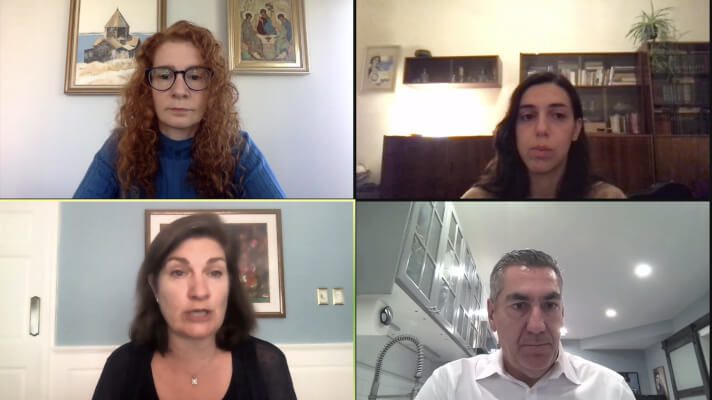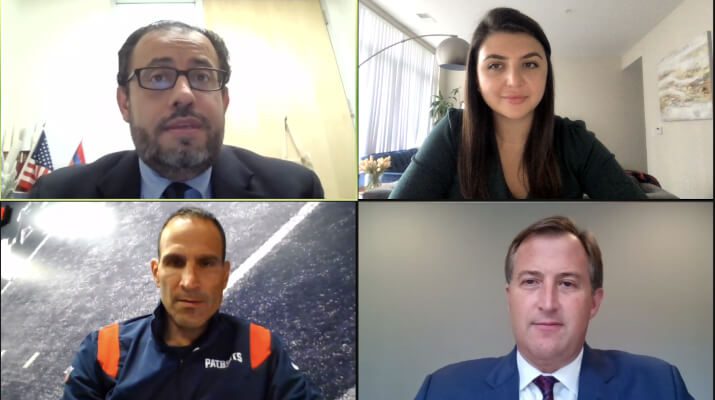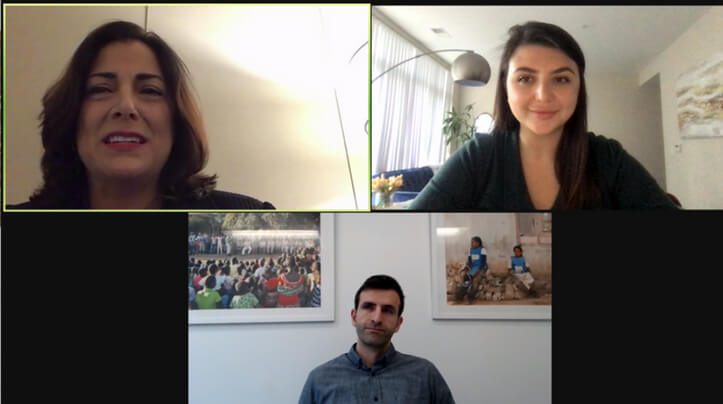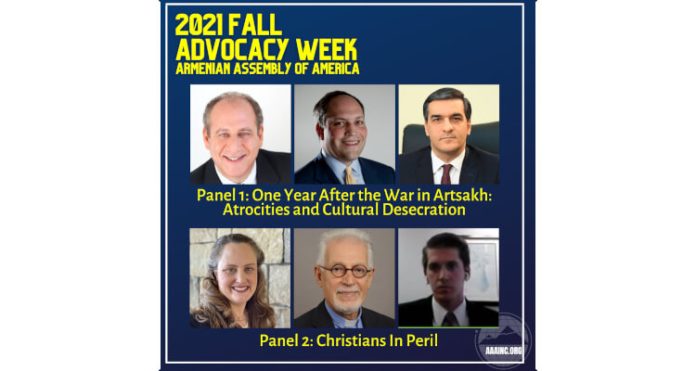The Armenian Assembly of America (Assembly) organized its Fall 2021 Advocacy Week in a virtual manner during the week of September 27, 2021 in remembrance of the first anniversary of the 44-day war on Artsakh. Panel discussions by specialists addressed such topics as the “One Year After the War in Artsakh: Atrocities,” “Cultural Desecration and Christians in Peril,” “Working to Make Artsakh Safe and Green,” “Fuel Advocacy,” and “Media Matters.”
“Their Goal is to Erase the Armenian Identity”
The inaugural panel, moderated by David L. Phillips, focused on the adversity that the people of Artsakh are currently facing, including “security and human welfare challenges.” Phillips, Director of the Program on Peace-building and Rights at Columbia University’s Institute for the Study of Human Rights, who established the Artsakh Atrocities project, noted that the armed drones and jihadist mercenaries provided by Turkey “shaped the battlefield” and “changed the outcome of the war.”

Arman Tatoyan, the Human Rights Defender (Ombudsman) of Armenia, discussed the implementation of the November 9 ceasefire statement, the ongoing problems of the Armenian prisoners of war unjustly held hostage by the Aliyev regime, the roots of the conflict, and Azerbaijan’s incursions into Armenia’s borders in Syunik and Gegharkunik provinces.
“This cruel war by Azerbaijani military forces is the result of years of state-supported hatred towards Armenians in Artsakh and Armenia,” said Tatoyan, who studied over 300 videos of beheadings, killings, and mutilations of soldiers and civilians by Azerbaijani forces.
Tatoyan also touched upon the “illegal and artificial” proceedings in Azerbaijan of Armenian POWs who remain in captivity, despite the clear terms of the November 9 ceasefire statement and its provisions that all POWs must be released and repatriated.

“Armenians returned [Azerbaijani] POWs but Azerbaijan has politicized the whole process and is using the existing POWs for bargaining purposes and to acquire control over the territories,” said Tatoyan. “Their goal is to erase the Armenian ethnicity.”
Dr. Michael Rubin, Senior Fellow at the American Enterprise Institute, who is an analyst of developments in Iran and the South Caucasus region and a critic of Turkey’s genocidal policies, elaborated that the war on Artsakh was a “test case” and has larger implications for the region.
Dr. Rubin explained that there have been a number of attacks across the Armenian border, and that Aliyev is putting his “rhetoric into the realm of reality» by testing the Armenian border. He reminded the audience that the November 9 ceasefire statement was «not a peace agreement,” and that the U.S. has been “absent, ineffective, and relatively passive by treating the two sides with moral and policy equivalence.”

Rubin pointed out that although President Biden and his Administration «rightly acknowledged the Armenian Genocide,» U.S. Secretary of State Antony Blinken, only two days later, “illegally by the letter and spirit of law» waived Section 907 of the FREEDOM Support Act.”
“We’re giving countries like Azerbaijan a free pass, which doesn’t end well for stability in the South Caucasus, and it’s time for the U.S. to wake up,» Dr. Rubin concluded.
Awareness, Assistance and Advocacy
“Cultural Desecration and Christians in Peril” was moderated by Reverend Dr. Mae Elise Cannon, Executive Director of Churches for Middle East Peace, and featured Archbishop Vicken Aykazian, Ecumenical Director and Diocesan Legate of the Diocese of the Armenian Church of America (Eastern) and Board Member of Churches for Middle East Peace, and Andrew Crane, Advocacy Associate at International Christian Concern (ICC).
Crane spoke about the ICC’s focus on the three A’s: awareness, assistance and advocacy, which are all used to “respond to these problems in Artsakh.”
“To increase awareness, ICC went to work covering the war itself to highlight the broader narratives, including the erasing of Christianity and war crimes perpetrated by Azerbaijan and Turkey,” said Crane.
Following the war, ICC released three reports and hired two staff members to work full-time on the ground in Artsakh to assess humanitarian needs. The ICC has also joined the Armenian community’s advocacy efforts in Washington, D.C.
“ICC will continue to work with the Armenian Assembly of America to push back Azerbaijan and Turkey’s erasure of Artsakh’s rich culture and its destruction of churches,” he said.
Crane focused on the importance of education, studying the history, and staying up to date on the news because “Turkey and Azerbaijan are putting forth a perpetual narrative that this is a territorial dispute, but this falls into a pattern of Turkish and Azerbaijani actions against the Armenian people to erase the Christian identity of Artsakh and Armenia.”
During his remarks, Archbishop Aykazian stressed the importance of being “aggressive in advocacy,” and highlighted Azerbaijan and Turkey’s purpose to “erase everything that is Christian in that part of the world. By destroying the church, they destroy the spirit of every Christian in the world.”
Revitalizing Communities Through Greenery
Jeanmarie Papelian, Executive Director of Armenia Tree Project (ATP), and Amasia Zargarian, Deputy Head of Government Affairs of The HALO Trust USA, were featured in the “Working to Make Artsakh Safe and Green” panel, moderated by the Assembly’s Congressional Relations Director Mariam Khaloyan.
Founded by Carolyn Mugar in 1994, ATP has planted almost 7 million trees and has greened over 1,300 communities in Armenia and Artsakh while employing thousands of people to date, including local villagers who are often seasonal workers.
ATP is “revitalizing and engaging communities” as a result of its work, despite the fact that it lost 14 Community Tree Planting sites in Artsakh during last year’s war. Papelian noted, however, that they have new plans for the future thanks to ATP donors, who are “improving the environment and the economy of Armenia when they support ATP.”
Looking ahead, ATP’s goal is “ensuring that the next generation of children in Armenia and Artsakh be better stewards of the environment.” As a means to achieve that, ATP is establishing a nursery in Stepanakert, which will be located on the grounds of the Stepanakert Botanical Gardens, and where locals will be employed to run the nursery.
The HALO Trust USA’s Amasia Zargarian estimated it will take another four years to clear most of the unexploded ordnances remaining in Artsakh, though “a good number of cluster munitions have already been cleared around the towns of Martuni, Martakert, and Askeran.”
“It is important to point out how different the cleanup challenge is now, after the 44-day war, versus the cleanup after the first Artsakh war in the early 1990s,” said Zargarian. “So much of the explosive threat this time is inside civilian-populated centers in Artsakh, and not just in the outskirts of towns and villages, as was the case in the immediate aftermath of the first war.”
Zargarian reported that the clearing of cluster munitions and unexploded ordnances in Stepanakert, which has been a priority for The HALO Trust, will be completed in October 2021. He emphasized that 99% of The HALO Trust’s staff on the ground in Artsakh are locals and 150 are employed full time, while more than 20% of the current staff are displaced Armenians. Zargarian added that The HALO Trust «is proud to employ them.»
“We rely on organizations like the Armenian Assembly of America to advocate for Congressional support, in order for HALO to get the job done,” he concluded.
Fueling Advocacy Positively Impacts Legislation
The “Fuel Advocacy” panel, featuring New England Patriots Director of Football/Head Coach Administration, Berj Najarian, Assembly’s Western Region Director Mihran Toumajan, Director of Congressional Relations Mariam Khaloyan and Executive Director Bryan Ardouny, highlighted the importance of grassroots as well as targeted advocacy to achieve results that benefit the Armenian people.
Najarian said it is a “great honor and duty” to use his platform in an effective manner. His activism increased in 2015 when he became an advocate for U.S. reaffirmation of the Armenian Genocide during the centennial commemoration. He noted that within the Patriots organization, there are “players, coaches, and owners who use their voice” to create change.
“I’m going to continue stepping up and doing it in a respectful but firm way,” said Najarian. “There has been receptiveness, not only in the organization, but different organizations and people outside of it, so we’re going to keep going.”
Najarian commented on the importance of inclusivity in advocacy efforts and to approach causes “thoughtfully, strategically, and creatively.” He said that he informs non-Armenians about Armenia and Artsakh, and that the large Armenian flag in his office that greets Patriots players every day “has become a conversation sparker.”
Toumajan remarked on the Assembly’s activities on the West Coast, where he has been engaged with California state officials and testified before a State Senate Committee earlier this year regarding local agencies divesting from Turkey and Turkish government-controlled bonds, under State Senator Anthony J. Portantino’s leadership.
Ardouny expressed the Assembly’s appreciation to its network of State Chairs and activists across the country and highlighted the importance of the successful passage of five decisive amendments to the National Defense Authorization Act in late September 2021. Ardouny also talked about the importance of affirmation of the Armenian Genocide and the Senate Foreign Relations Committee’s (SFRC) confirmation hearing of U.S. Ambassador to Turkey nominee and former U.S. Senator Jeff Flake (R-AZ).
Highlights from an exclusive interview with Armenian Caucus Co-Chair Rep. Frank Pallone (D-NJ) were also shared. Rep. Pallone noted that through the work of the Congressional Armenian Caucus and with the support of the Armenian Assembly and other organizations, $50 million in humanitarian and economic development assistance was secured for Armenia, and $2 million for demining in Artsakh during the current Congressional session.
“I would continue to encourage Assembly members to reach out and make sure your members join the Caucus,” said Rep. Pallone.
Finally, Rep. Frank Pallone commented on the importance of advocacy and reflected on the overwhelming passage of the Armenian Genocide resolution in the U.S. House of Representatives.
“There were many times when I didn’t think we would ever get Armenian Genocide recognition, but it happened, not just by a miracle, but because of all of the hard work,” said Rep. Pallone. “I want to use that as an example to tell everyone in the Armenian diaspora that you can never give up and to stay active.” Echoing Rep. Pallone’s sentiments, Ardouny concurred that “we never gave up and we never gave in,” and again expressed appreciation for activists like Berj Najarian for helping make a difference.
The final panel discussion, “Media Matters,” evaluated the mainstream media’s coverage of the 44-day war on Artsakh. Featured panelists included Peter Mirijanian, founder of Peter Mirijanian Public Affairs, Arda Haratunian, a strategic communications advisor, and Lilit Markosian, a journalist based in Yerevan and New York City. Assembly Communications Director Taleen Babayan served as the moderator.
One challenge in terms of coverage has been the decline of foreign news bureaus and correspondents, according to Haratunian, which can contribute to the lack of timely and accurate reporting. «Fewer foreign correspondents are covering more countries, conflicts and stories and, in some cases, with less regional or historical expertise,» said Haratunian. «Armenians are fighting a media war largely punching at ghosts, with fewer people paying attention to it.»
It’s also incumbent upon the Armenian American community to provide proper context to journalists and publications to «move the ball forward here in the U.S.,» said Mirijanian, who noted the need to create opportunities to speak with editors and reporters about Armenia and Artsakh year-round, and not just during a time of conflict.
Haratunian said it’s important for Armenians to “maintain the staying power” after a crisis, and to focus on more universal stories that humanize the Armenian people and their plight.
“We have the truth on our side,” said Haratunian. “And that truth has to be shared patiently and methodically.”
Regarding the coverage of independent journalists who reported from Artsakh during the war, Markosian stated that such individuals “put themselves at great personal risk to capture and produce stories,” but ultimately did not have the same platforms to widely air their reports, as opposed to the mainstream media. Social media also served as a resource during the war, although the conversations were not enough to fill the gaps of coverage.
All three panelists honed in on the importance of framing a clear narrative moving forward.
“Sometimes we, as a community, take for granted the role that Armenians have played in this country [the U.S.], and also the context of the Armenian Genocide, and do not properly present our narrative to the mainstream media,” said Mirijanian, who emphasized the importance and effectiveness of grassroots advocacy in the diaspora through organizations like the Armenian Assembly of America.
While the Armenian Genocide was heavily covered by The New York Times, an early whistleblower at the time, there was a disparity in coverage during the 2020 war on Artsakh.
“The players involved and their values made the difference during the previous century when the Armenian Genocide was covered by The New York Times,” said Haratunian.
In closing, Mirijanian stated that educating journalists and the media by deploying a common narrative should be an ongoing responsibility for Armenians in the homeland and across the diaspora.

